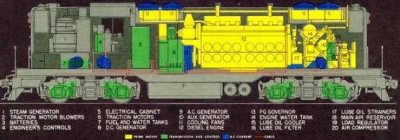| « 2002 Saturn SL2 Would Not Start | Tesla Phone vs Latest iPhone - A Comprehensive Comparison » |
The Benefits of Diesel Electric Propulsion over Battery Electric Propulsion
04/16/23
The Benefits of Diesel Electric Propulsion over Battery Electric Propulsion
Diesel electric propulsion and battery electric propulsion are two of the most common powertrain technologies used in the transportation sector. While both technologies have their strengths and weaknesses, there are several advantages to diesel electric propulsion over battery electric propulsion. In this article, we will examine the cost, reliability, and range benefits of diesel electric propulsion and explore the differences in minerals and rare earth materials needed to build diesel electric and battery electric vehicles.
Follow up:
For our purposes here we are only discussing electric drive systems, no Hybrid drives which use a combination of mechanical engine power combined with electric motor power to move the vehicle.
Cost Benefits of Diesel Electric Propulsion
One of the primary advantages of diesel electric propulsion is its lower cost compared to battery electric propulsion. Diesel electric engines are relatively simple, with fewer parts and less complex technology compared to battery electric powertrains. As a result, diesel electric vehicles have a lower manufacturing cost and are more affordable to purchase than battery electric vehicles.
Another cost benefit of diesel electric propulsion is the availability of diesel fuel. Diesel fuel is widely available and easy to transport, making it easier to maintain and operate diesel electric vehicles. In contrast, battery electric vehicles require expensive batteries that are difficult to manufacture and rely on rare earth minerals, which can be costly and difficult to obtain.
Reliability Benefits of Diesel Electric Propulsion
Diesel electric vehicles are known for their reliability and durability. Diesel engines are known to last for hundreds of thousands of miles without needing major repairs or maintenance. They are also less prone to failure than battery electric vehicles, which rely on complex electronic systems that can be susceptible to damage from extreme weather or accidents.
Range Benefits of Diesel Electric Propulsion
Diesel electric vehicles have a longer range than battery electric vehicles. Diesel engines have a higher energy density than batteries, which means that they can provide more power for a longer period of time. This makes diesel electric vehicles ideal for long-haul transportation, such as cars, trucks, trains and buses. Diesel electric vehicles are not subject to long electrical charging times, only enough time to refill the fuel tank with Diesel fuel.
Differences in Minerals and Rare Earth Materials
Diesel electric vehicles do not require as many minerals and rare earth materials as battery electric vehicles. Battery electric vehicles require lithium, cobalt, and other rare earth minerals to manufacture their batteries. These minerals are often difficult to obtain, and their mining and extraction can have negative environmental impacts.
In contrast, diesel electric vehicles rely on diesel fuel, which is widely available and does not require the extraction of rare earth materials. This makes diesel electric vehicles a more environmentally friendly option than battery electric vehicles.
Conclusion
Diesel electric propulsion has several advantages over battery electric propulsion, including lower cost, greater reliability, and longer range. Additionally, diesel electric vehicles require fewer minerals and rare earth materials, making them a more environmentally friendly option. While battery electric vehicles have their own strengths and are becoming more popular, diesel electric propulsion remains a viable and effective option for many transportation applications.
#DieselElectricPropulsion #BatteryElectricPropulsion #TransportationSector #CostBenefits #ReliabilityBenefits #RangeBenefits #RareEarthMaterials #EnvironmentallyFriendly #SustainableTransportation
Like Computer Care on FaceBook
Follow us on Twitter
computer Care on Pinterest
computer Care on instagram
Visit the Computer Care Catalog Online for all your part needs.

